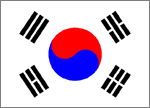South Korea to spend $85 billion on green industries
 By Cho Meeyoung, Reuters - South Korea will invest 107 trillion won ($84.5 billion), or 2 percent of its annual GDP, in environment-related industries over the next five years, the presidential office said in a statement on Monday.
By Cho Meeyoung, Reuters - South Korea will invest 107 trillion won ($84.5 billion), or 2 percent of its annual GDP, in environment-related industries over the next five years, the presidential office said in a statement on Monday. The investment, mainly for encouraging green growth industries and technologies such as renewable energy, LEDs (light-emitting diodes), smart power grids and hybrid cars, is expected to create up to 1.81 million jobs, the government said.
Under President Lee Myung-bak’s regime, Seoul’s Blue House has been trying to find a way to revitalise the country’s slowing economic growth by capitalising on the global drive to reduce polluting gas emissions.
“The investment is a move in the right direction as it signals the government’s intention to boost its competitiveness by leading in the greentech sector,” said Yong-Jin Kim, Head of Global Business Group at Daishin Investment Trust Management.
“Korea could be a niche player in the global greentech market as it promotes its LEDs and other manufacturing industries such as the auto industry with the focus on doing research to make production processes environmently friendly.”
The government gave no specific details over how it would fund the plan.
As part of the plans the government will require automakers including Hyundai Motor <005380.KS> and Kia Motors <000270.KS> to either raise the average fuel efficiency of their vehicles above 17 km per litre or cut greenhouse gas emissions below 140 grammes per kilometre from 2012, the Blue House statement said.
Above US Standards
“To advance in green car development, South Korea plans to raise the bar for auto fuel efficiency and greenhouse gas emission rules above U.S. standards,” a separate statement from the government said. Cars made in South Korea, the world’s fifth largest auto producer, currently have an average fuel efficiency of 11 km/litre and emissions of 201 g/km
Aggressive new standards unveiled by the United States in May would raise average fuel efficiency standards for all new passenger vehicles to 35.5 miles per gallon by 2016, the equivalent of 15.1 km/litre.
South Korea will apply the new fuel efficiency and emission rules to 30 percent of cars sold by each automaker in 2012, rising to 100 percent by 2015.
The government also aims to raise South Korea’s international market share of green technology products to 8 percent by expanding R&D investment and strengthening industries such as LEDs, solar batteries and hybrid cars.
The world’s 4th largest LED producer, Seoul Semiconductor <046890.KQ>, rose nearly 11 percent on the news, while hybrid car component maker Hyundai Mobis <012330.KS> gained 3.7 percent in a flat Seoul market <.KS11>.
The government said it will test trading carbon credits in 2011, for actual trading from 2012 onward. It will cut greenhouse gas emissions according to mid- and long-term goals to be finalised this year. It also set a target of localising nuclear power generation technology and exporting a nuclear power plant for the first time by 2012.
In a separate statement the South Korean president announced he will donate about 33.1 billion won ($26 million) - almost all of his personal fortune - to establish a new youth scholarship program.
President Lee, who took office in February last year had pledged during the election campaign to donate most of his personal wealth to society.
The former CEO of South Korean consortium Hyundai, who paid his way through university working as a street cleaner, has a reputation as a man who gets things done.
“Looking back, I realize that all of them who helped me were also not very well-off,” Lee said, referring to people who assisted him during his impoverished youth. “And I know that the best way for me to pay back such kindness is to give back to society what I earned.”
As mayor of Seoul, he made his mark by dismantling an unsightly elevated highway and restoring an ancient stream that has become a popular respite in the city of 10 million people.
Lee plans to donate three buildings he owns in Seoul to a foundation, and the rent from those will fund the students’ scholarships.

